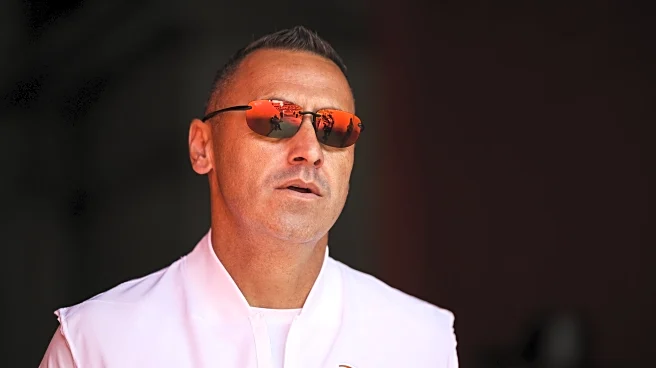In the 2015 season opener, the Texas Longhorns traveled to South Bend to play the Notre Dame Fighting Irish in Charlie Strong’s second season as the head coach on the Forty Acres, a highly-anticipated
matchup between two college football blue bloods with a history of huge clashes.
Except that one program didn’t deserve that description in that era in a disastrous result for the Longhorns, a 36-3 defeat that heralded a swift end to Strong’s tenure after producing only 163 yards of total offense as quarterback Tyrone Swoopes went 7-of-22 passing for 93 yards, the Longhorns gained just 60 rushing yards on 2.1 yards per carry, and converted just 2-of-14 third-down attempts in going three and out seven times.
Strong removed longtime assistant Shawn Watson as the play caller in the immediate aftermath of the South Bend beatdown after wasting the offseason trying to pivot from the West Coast offense the two ran successfully at Louisville with quarterback Teddy Bridgewater to an up-tempo, spread attack with which Watson was woefully unfamiliar.
With Jay Norvell elevated to play caller, Texas went to a run-heavy approach that ended the season with two rushing attempts for every pass, but at least averaged 5.1 yards per carry, recorded 27 rushing touchdowns, and engineered a shocking 24-17 upset of No. 10 Oklahoma.
However, despite the big rivalry win, the Longhorns finished 5-7 in part because Strong kept making offseason decisions during the season, a trend that continued in 2016 when Vance Bedford was removed as the defensive coordinator after the first conference game and contributed to Strong’s much-needed termination because of a 16-21 record over three seasons.
That ignominious chapter in Texas history is relevant 10 years later because the Longhorns just turned in the worst offensive performance in total yardage since that loss to the Fighting Irish in Saturday’s 16-13 overtime win over the Wildcats in Lexington that featured only 179 yards of total offense.
The result was much different for Texas on Saturday, and the overall context of the Steve Sarkisian era provides a stark contrast to Strong’s bumbling ineptitude, but that only makes the offensive incompetency against Kentucky all the more shocking.
Consider the trajectories of the primary architects of that Longhorns team in 2015. Strong flamed out at Texas, flamed out as the head coach at South Florida, and is now an NFL position coach. Watson was too ineffective to even serve as the offensive coordinator for a regressive head coach like Pat Narduzzi at Pitt and has now settled in as a bad head coach at Wofford who should be fired soon after an 0-5 start to the 2025 season. And Norvell just got fired as the head coach at Colorado State.
The outcomes for those coaches at Texas are all completely predictable in hindsight.
For Sarkisian, though, there is growing concern that he can’t sustain the success of the last several seasons, in particular his ability to handle play calling, quarterback development, and overall roster management.
Sarkisian’s ability to develop quarterbacks, previously a premier feature of his resume, is in question after Quinn Ewers went from generational talent to seventh-round draft pick and Arch Manning lingers in extreme narrative limbo after going from generational talent to a massively disappointing start to his career as the starter.
While Manning’s inconsistency manifested in multiple misfired passes to open receivers in critical moments, the fact that there are arguably bigger problems offensively for the Horns reflects extremely poorly on Sarkisian and his entire offensive staff, most notably offensive coordinator and offensive line coach Kyle Flood, whose unit produced 47 yards on 28 carries against the Cats and gave up three sacks among 18 pressures.
Offensively, it’s a poor operation all around for Texas — Manning’s poor accuracy is at odds with what he’s previously put on tape for the Longhorns, the offensive line can’t create holes or pick up blitzes or handle line games, and there’s a glaring lack of game-changing ability at the skill positions.
Those are all indictments of Sarkisian and his staff in evaluating, developing, and managing the roster with the failure to field even average starters at left guard and center causing disastrous ripple effects across the rest of the offense.
So far all the job security that Sarkisian earned with back-to-back College Football Playoff appearances and the reputation he’s developed as one of the best offensive minds in college football, there are major cracks showing with an offense that he owns completely in his fifth year, raising questions about whether the staff continuity previously hailed as a program advantage has now turned stale.
After all, the last time the Longhorns offense looked this bad, it was cause for demotion and eventual termination amidst a crumbling regime.









